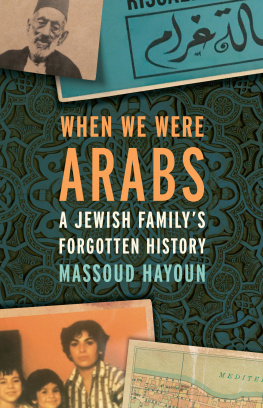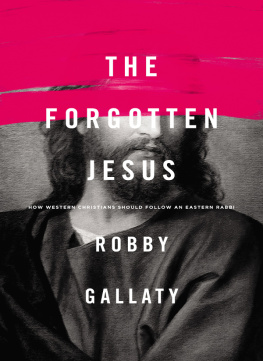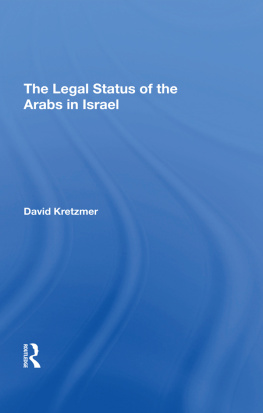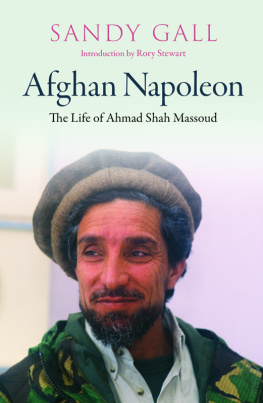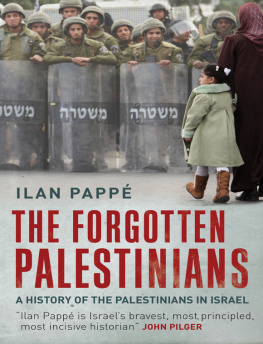Massoud Hayoun - When We Were Arabs: A Jewish Familys Forgotten History
Here you can read online Massoud Hayoun - When We Were Arabs: A Jewish Familys Forgotten History full text of the book (entire story) in english for free. Download pdf and epub, get meaning, cover and reviews about this ebook. year: 2019, publisher: The New Press, genre: Home and family. Description of the work, (preface) as well as reviews are available. Best literature library LitArk.com created for fans of good reading and offers a wide selection of genres:
Romance novel
Science fiction
Adventure
Detective
Science
History
Home and family
Prose
Art
Politics
Computer
Non-fiction
Religion
Business
Children
Humor
Choose a favorite category and find really read worthwhile books. Enjoy immersion in the world of imagination, feel the emotions of the characters or learn something new for yourself, make an fascinating discovery.
- Book:When We Were Arabs: A Jewish Familys Forgotten History
- Author:
- Publisher:The New Press
- Genre:
- Year:2019
- Rating:5 / 5
- Favourites:Add to favourites
- Your mark:
- 100
- 1
- 2
- 3
- 4
- 5
When We Were Arabs: A Jewish Familys Forgotten History: summary, description and annotation
We offer to read an annotation, description, summary or preface (depends on what the author of the book "When We Were Arabs: A Jewish Familys Forgotten History" wrote himself). If you haven't found the necessary information about the book — write in the comments, we will try to find it.
When We Were Arabs: A Jewish Familys Forgotten History — read online for free the complete book (whole text) full work
Below is the text of the book, divided by pages. System saving the place of the last page read, allows you to conveniently read the book "When We Were Arabs: A Jewish Familys Forgotten History" online for free, without having to search again every time where you left off. Put a bookmark, and you can go to the page where you finished reading at any time.
Font size:
Interval:
Bookmark:

WHEN WE WERE ARABS
WHEN WE WERE ARABS

A JEWISH FAMILYS FORGOTTEN HISTORY
MASSOUD HAYOUN

For our youth

When common people seek life,
Destiny will verily respond,
And the darkness will surely pass,
And shackles will surely shatter.
/ Abou el-Kacem e-Chebi from 1933 poem / Those Who Seek Life, adopted as part of the national anthem of Tunisia in 1987
,
!
I am Arab, I am Bedouin
And I am a daughter of the Arabs!
From / Bint el-Aarab (Daughter of the Arabs), written by composer Salah el-Mahdi, performed by legendary Jewish Tunisian singer / Louisa Saadoun (known by stage name / Louisa Tounsia / Louisa the Tunisian), record released in 1961
CONTENTS
WHEN WE WERE ARABS
INTRODUCTION
I am a Jewish Arab. For many, Im a curiosity or a detestable thing. Some say I dont exist, or if I did, I no longer do.
I reject these ideas. My rejection demands that I paint for you a lost world to prove that we existed. Sadly, many of the faces, sounds, and moods of the last days of chez nous, of my grandparents world, are totally gone. And only so much can be reconstructed here in writing, without the help of the film and song with which my grandparents recalled to me our civilization and its decline.
In the minds of many non-Jewish Arabs who remember us fondly, we are preserved in the cinema of a colonial erathe so-called Golden Age of Egyptian cinema that flourished from the 1940s to the 1960s. My grandparents generation, portrayed in those old films, drips with poetry and grace. The films star Jewish Arab actors and singers but arent about Jewish Arabs; rather, they recall a society in which we existed without question. We are a reminder of the cosmopolitanism, the pluralism, and the colonial degradation of that timea time of fresh-pressed suits and tarbooshes, of singing about our anguished feelings as we walk along the Nile.
Others view Jewish Arabs this way too. Once, a European American journalistan enthusiast of our region, you know the sortwho knew I was Arab but not that I was Jewish, told me of The Man in the White Sharkskin Suit, Lucette Lagnados memoir of her Egyptian Jewish familys departure from Egypt. Id already read it, but I didnt say so; I was keen to hear what hed have to say. He told me the Jewish Egyptians are forever part of a bygone era of romance and poetry. Difficult as it was to nod and smile at this, a compliment is better than a kick in the teeth, as my grandfather would say when he heard people suggest, for example, that Arabs are more given to passion (in other words, barbaric) and that Jews are good with money (so, cheap).
Maybe we are trapped in a cinematic or historical Golden Age. Maybe we, the Jewish Arabs, have indeed ceased to exist in real time. In my grandparents home in Los Angeles, I was raised on recollections, some more faded than others, of a lost world that had existed for as long as we could remember only to end suddenly in my grandparents generation. My grandparents Arabicwhich my grandfather tried to teach me every summer at our kitchen tablewas the dated colloquial Arabic of those films. In some respects, we share the experience of many other American immigrants, our heads often turned back toward a far-flung past. On Saturdays, we watched Arab American Music Television for an hour on the all-purpose foreigner channel, Channel 18, between Indian American and Korean American programming. That was our slot. But they must have been reruns. The Armenian Lebanese man in Glendale from whom we bought the CDs we liked said that Egyptian pop star Amr Diab and Lebanese pop star Nawal al-Zoghbi had already come and gone in popularity in the Middle East. He knew better than we did. Unlike the shop owner, we didnt regularly return to our homelands. Our exile was a fait accompli.
Because I was raised by my maternal grandparents, Daida and Oscar, and am obstinate like them, my instinct is to refute unequivocally the suggestion that I am of the past, a stillborn. Whether or not thats true, this book is intended to breathe life into my grandparents and to avenge their lives, which multiple incarnations of imperialist white supremacy truncated and warped to political ends at so many turns. This book is also a wholesale rejection of the sentimentality, well-meaning as it is, that sets the Jewish Arab in the imagined past of our at once enjoyable and insidious classic movies. It is ironic, then, that these very same films are among the little that was left to my family after we left our homes and that they became indispensable to us in our struggle to remember who we were.
When Oscar left Egypt in 1950, around the same time as the vast majority of Jewish Egyptians, there was a limit to what he could bring; the rest was claimed by the Egyptian government. He brought some clothes, a few books, and some records of songs from filmsthey were all musicals. He brought with him, too, a gold bangle that he had intended to sell. Even at his poorest, he never did, and today I wear it around my wrist. Some of the records cracked on the journeys from Egypt to France to the early Zionist State back to France, then to the Bronx, and to the more familiar Mediterranean climes of Los Angeles. He had a superhuman power to see the good in everythingto take the good and leave the bad, as he said. Even damaged records from Egypt were better than nothing.
In Paris, in the early 1960s, these records were even more valuable for my grandparents. Oscar, of Jewish faith with an Arabic-language surname and a North African countenance, for all his education in Egypt and fluency in five languages, couldnt find a regular job in Paris to support his wife and two daughters. So he sold textiles door-to-door in the first real winter hed experienced and with no great success. The wind cut the skin, hed recall. He felt he was living on the edge of civilization in the end of times, the superficial beauty of Pariss facades a mockery as the war for Algerian independence raged and young white Frenchmen died killing countless Algerians to defend what French politicians had convinced much of the world was their just presence in North Africa. The white deaths fanned the flames of white resentment against Arabs and other newcomers who had traveled to France to subsist on the fruits of the empires blood-drawing expansionism. For Oscars family, there was no hope for survival in this France.
At the time, Oscar and Daida frequented an Arabic movie house in the Parisian neighborhood of Barbs, which remains one of the citys postcolonial immigrant enclaves. Go there today, and youll see that not much has changed. Facing the tides of populism and failed integrationist policies, the people cling to each other in these neighborhoods, in Barbs, in Belleville, and Porte de Clichy, and in the suburban ghettos of the likes seen in the 1995 film La Haine. Young men, of the age my grandfather was when he was there, stand on the roadside, waiting for a chance to be the breadwinners of their familyto feel like what theyre taught men should be. These are the parts of town where French people of color are made to languish in poverty. It was in these parts that Tho Luhaka was sodomized by police with a baton in 2017, a presidential election year when the populist National Front made unprecedented strides onto the political stage. But these neighborhoods are not pockets of misery so much as of resilience. As my grandparents did in their time, people go to these Arab, African, and Asian neighborhoods to watch movies, smoke shisha, drink fresh fruit juice or tea, and survive the loneliness of exile and forget a system that has willfully forgotten them.
Font size:
Interval:
Bookmark:
Similar books «When We Were Arabs: A Jewish Familys Forgotten History»
Look at similar books to When We Were Arabs: A Jewish Familys Forgotten History. We have selected literature similar in name and meaning in the hope of providing readers with more options to find new, interesting, not yet read works.
Discussion, reviews of the book When We Were Arabs: A Jewish Familys Forgotten History and just readers' own opinions. Leave your comments, write what you think about the work, its meaning or the main characters. Specify what exactly you liked and what you didn't like, and why you think so.

